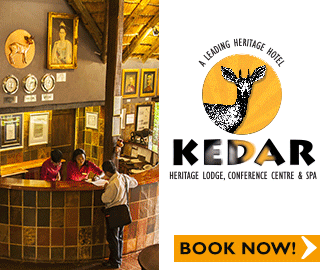
The Air Up There
BY JO KROMBERG 19 SEPT, 2016 07:54
From humble beginnings to owning his own helicopter company - David Simelane is headed for great heights. And egotistical is the last thing he is - even though he has reason to be. At age 36, this bright, charming, soft-spoken helicopter pilot and owner of his own helicopter charter company, has already accomplished what most people cannot pull off in a lifetime.
Without the benefits of parental political influence, he is one of only a handful of black helicopter pilots in the country - and the only black co-owner of his charter company, Ultimate Heli, operating out of Grand Central Airport in Midrand, Gauteng. Despite humble beginnings, his parents gave him the best education they could afford and he passed his O Levels at Saint Marks high school in Swaziland (David’s mother is Swazi and his father is South African), but they did not have the funds to send him to university.
Back in South Africa, he embarked on an internship in computer networking through Metrorail in 1999. "I was always interested in computers, so it made sense for me to go that route." Piloting helicopters to him at this point was akin to walking on the moon. "I worked hard and caught on quickly and I was then offered a job at Boogertman and Partners, an architectural firm in Pretoria. Werner Alberts, one of the partners in the company went round the office one day inviting people to join him on a helicopter flight he was piloting. Mysteriously, they all politely declined, but I jumped at the chance, only to discover later that this was his first flight as a qualified pilot and I was to be his first passenger!" He was hooked straight away.
Werner asked him if he could see himself doing this the rest of his life and the dream was born. The two of them created a business plan and went to the government transport SETA with high hopes of introducing (with the SETA’s financial backing) gifted, black, would-be pilots into the training program, but the course cost R500,000 per pilot (about $30,000) - more than twice that of a fixed-wing pilot’s training. "We kept at it for three and a half years, but they wouldn’t budge." In the meantime, his IT career was taking off and he was about to head into the big time with a great job offer, when the SETA finally let them know that they had decided to fund the pilot training initiative.
"Now I was faced with the biggest decision of my life. I had a wife and new baby at home and the IT world would provide stability and a good income, but suddenly the possibility of realising my dream was right there in front of me." It took some soul searching, but the dream won out and together with four other incumbents, he started his helicopter pilot training on August 15, 2004. Only two of them eventually qualified, and on 21 April 2006, he received his commercial helicopter pilot’s license.
And he worked his proverbial backside off getting there. "Terms like Black Economic Empowerment simply do not apply in this profession. You start from the bottom and there are no short cuts, no matter who you are connected to or the colour of your skin. If you are not properly trained or do not understand every single minutia of the technical aspects of the aircraft and proper procedures, lives are literally at stake.
I feel privileged though in another way because as hard as the course was - and believe me, it was blood, sweat and tears at times - I will always know that my achievements are based solely on merit and nothing else," said Simelane.

"Should I wear my uniform?" David
Simelane asked me on the phone after we
decided on a date for our photo shoot. "Of course!" I replied. "Why wouldn’t you?" "Well, I don’t want to come off as egotistical."

And achievements he has aplenty. He worked for Netstar Vehicle Tracking, chasing bad guys for a couple of years - an experience he describes as “one of the most adrenaline fueled, satisfying experiences of his life''. "Going home and knowing you may have helped to save someone’s life and got criminals caught that day is a great feeling."
His company Alpine Aviation then started a commercial helicopter route between Johannesburg and Vilancoulos in Mozambique, which he headed up to get experience on turbine choppers, a lucrative skill in the industry. He also worked in the north of the country for a Brazilian mining company. "I was based there for half a year during 2008 and then the economy took a serious dive. We had to cut down on flights drastically. I had to watch as bad business decisions were being made without personally having any real influence and I had to walk away."
Luckily, the South African Broadcasting Corporation hired him to choreograph the entire aerial footage for the 2009 National Elections. He then went to work for the Civil Aviation Authority, but he had already had a taste of freedom and running his own show and the bureaucracy, red tape, admin and deadly routine proved too much for such a free spirit.
"Alpine was sold and in 2010 I was invited to join the new, reborn company once again." However, his excitement didn’t last. "It didn’t work. Money was dreadfully mismanaged and the company had to close down finally. It was an awful time." He then decided to take the plunge and start his own company. On 24 October, Ultimate Heli was born with him and partner Shaun Roseveare as co-founders and directors. They incorporated their previous staff of five people and grew their staff compliment to 20 staff members.
Since then, he has flown dignitaries, movie stars, billionaires and presidents, but one of his fondest memories is his very first flight as Ultimate Heli. "I flew the Top Gear guys to the Magaliesberg. Jeremy Clarkson is a fantastic guy and I have since flown him and his son as well."
So what does the future hold? "Shaun and I are currently exploiting opportunities north of the Limpopo. There is massive growth in Africa for our industry and that is where our expansion vision lies as well as laying the foundation for the company to operate independently of us eventually - shouldn’t that be the goal for all company owners?" Right now Ultimate Heli is developing their very own heliport in the Waterval area of Midrand, to be completed this year. "I want to be ready for whatever comes. Ours is a volatile industry and the best I can do is try to adapt to any situation.
Who knows what the future holds? As long as we have a strong foundation, I’m sure we can weather any storm." And the most satisfying part of his job? "Being able to pay my staff properly and see them thrive."
David in one of his Helicopters. Photo: Supplied














